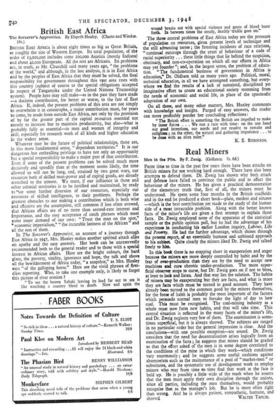British East Africa
BRITISH EAST AFRICA is about eight times as big as Great Britain, or roughly the size of Western Europe. Its total population, of the order of 13,000,000 includes some 200,000 Asiatics (mostly Indians) and about 42,000 Europeans. All the rest are Africans. Its problems are, in truth, as Mr. Churchill said many years ago, "the problems of the world," and although, in the last analysis, it is in East Africa and by the peoples of East Africa that they must be solved, the final responsibility for government throughout this vast area rests with this country (subject of course to the special obligations accepted in respect of Tanganyika under the United Nations Trusteeship system). People here may still make—as in the past they have made —a decisive contribution, for better or worse, to the fate of East Africa. If, indeed, the present problems of this area are not simply to overwhelm it in catastrophe, a major contribution must, for years to come, be made from outside East Africa, not only by the provision of by far the greater part of the capital resources essential not merely to increase but to maintain productivity, but also—what is probably fully as essential—in men and women of integrity and skill, especially for research work of all kinds and higher education in the widest sense.
Whatever may be the future of political relationships, these are, in this more fundamental sense, "dependent territories." It is our dangerous but enthralling privilege to have not only an opportunity but a special responsibility to make a major part of that contribution. Even if some of the present problems can be solved much more decisively and speedily than at the moment seems likely, the time allowed us will not be long, and, strained by two great wars, our resources both of skilled man-power and of capital goods, are already stretched to the utmost. We must, if our influence in these and other colonial territories is to be justified and maintained, be ready to "see some further diversion of our resources, especially our resources of skilled intelligence, to their problems. Perhaps the greatest obstacles to our making a contribution which is both wise and effective are the assumption, still common if less often avowed, that African affairs are of no more than second-rate interest and importance, and the easy acceptance of catch phrases which meet some inner demand of our own: "Trust the man on the spot," "economic imperialism," "the incurable laziness of the African" and all the rest of them.
In The Sorcerer's Apprentice, an account of a journey through East Africa in 1947, Mrs. Huxley makes another spirited attack alike on apathy and the easy answers. Her book can be unreservedly recommended both to the general reader and to those with a special interest in African affairs. Here are the bright colours, the hard glare, the poverty, vitality, ignorance and hope, the talk and above all the bewilderment of -Africa today, "a snapshot," as Mrs. Huxley says "of the galloping horse." Here are the vivid phrases of first- class reporting. Who, to take one example only, is likely to forget this picture of river erosion ? "To see the brown Sabaki leaving its load far out to sea is like watching a country bleed to death. Now and again the
wound breaks out with special violence and gouts of blood burst forth. In between times the steady, deathly tricklegoes on."
The three central problems of East Africa today are the pressure of population on resources, given present levels of technique and the still advancing tsetse ; the festering incidents of race relations, "continual outcrops through the crust of behaviour of a code of racial superiority ... these little things that lie behind the suspicion, obstinacy, and non-co-operation on which all our efforts in Africa may yet founder "; and, in the largest sense, the problem of educa- tion. "The fundamental business of government in Africa is education," Dr. Oldham told us many years ago. Political, moral, technical education, in all we have attempted something, but every- where we find the results of a lack of sustained, disciplined yet imaginative effort to create an educational society stemming from the needs of economic and social life, in place of the spasmodic adaptation of our own.
On all these, and many other matters, Mrs. Huxley comments with knowledge and insight. Purged of easy answers, the reader can more profitably ponder her concluding reflections:
"The British effort is something the British are impelled to make by inner forces . . . We run a race with time: on the one hand our good intentions, our needs and our resolve to remake and enlighten ; on the other, the natural and gathering impatience ... to be dons with an alien ruler."
K. E. ROBINSON.


































 Previous page
Previous page